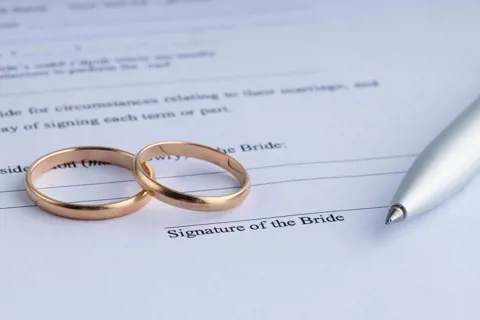Are Prenup and Postnuptial Agreements Legally Binding?
Prenuptial and postnuptial agreements are not currently legally binding, but if you both got independent legal advice then the Court will consider your agreement unless there is a good reason not to.
Generally, the Court will look at:
- If you or your partner got independent legal advice when making the agreement
- If you or your partner were under pressure to sign the agreement
- That you both provide full financial disclosure of your assets
- That the person who had the most to lose understood the terms of the agreement
- Whether it would be unfair if the agreement was upheld, for example if your financial situation had completely changed
Getting specialist legal advice from one of our Family Law Solicitors during the process can help reduce the chances of the Court misinterpreting your agreement and make sure it is valid. This will mean your assets will be much more likely to be divided in line with your pre or postnuptial agreement.
What are the benefits of a Prenup?
I’s well worth getting a Prenup if any of the following apply to you:
- You already own your home and want to protect your ownership.
- You have or will be given an inheritance and want to protect it.
- You’ve been married before and want to safeguard the financial settlement you got after you divorced.
- You’ve been widowed and want to protect your possessions before remarrying.
- You believe that if your marriage came to an end, you’d have to go through a lengthy Court dispute over your assets.
- You’ve acquired wealth and want to make sure you can leave enough to your children when you make a Will.
- You are a high earner and want to protect your income, bonuses or any investments that you have accrued.
- Your partner comes from overseas and you want to move to their country of residence, but it has unfavourable laws on how a couple should split their assets.
- You have business assets prior to entering the marriage that you want to protect.
- You need to protect your interest in property held overseas.
Prenup and Postnuptial Agreements have also become more popular with people who are marrying for a second time. They may have been through a messy divorce in the past, so they believe it’s best to have a defined agreement in place from the outset. Here are the benefits of organising a prenup before you get married:
- Protect Your Wealth: People who are remarrying tend to have greater assets, and may also have children from a previous relationship that they need and wish to provide for.
- Reduce Conflict in Case of Divorce: Bitter divorce battles can be lengthy and can see separating couples spending large sums of money on legal costs as they fight each other for the divorce settlement they want. With a Prenup or Postnuptial Agreement in place, this potential cause of conflict can be taken out of the equation.
- This can mean a more constructive and amicable approach to divorce, with less time, energy and money being spent on a lengthy dispute at a time when feelings are already running high.
- Ease Conflict During Marriage: Some financial worries may only manifest themselves during the marriage itself and become a cause of stress. If you’ve married without taking out a Prenup, it’s not too late to take steps to prepare for a possible split. Getting a Postnuptial Agreement could help you to get some clarity over areas you disagree on, so any financial concerns you’ve had before no longer need to be an issue.
- Protect Your Children’s Future: With a pre or postnup, you can make sure that your children will get the possessions and support you’d like them to have and keep them out of any possible arguments that could come up from not having an agreement set out early.
What Is The Difference Between Prenup and Postnup?
A Prenuptial Agreement also referred to as a Prenup, is an agreement made between couples who are engaged to be wed. They can also be made after a couple has married, and these are called Postnuptial Agreements.
A prenuptial agreement is a formal written agreement that you can draw up before you get married which lets you decide who gets what if you ever need to divorce.
A postnuptial agreement works in the same way as a prenup, but it lets couples who are already married set out what they want to happen to their assets.
What is in a Prenuptial Agreement?
Once you and your partner have decided to put a Prenuptial Agreement (Prenup) in place, you need to think carefully about what you need to include in it. No two Prenuptial Agreements are the same, as each couple will tailor their agreements to suit their own particular circumstances.
You might have some assets in mind when making a pre or postnup, but you should include as much detail as you can so you know exactly what your separation would look like. You can include:
- The exact division of assets, including savings and pensions
- How any debts will be paid off
- Your income or future incomes, including inheritance if relevant
- Property and your living arrangements or how you’ll divide properties
- Spousal maintenance payments, if necessary, with bills and living expenses included
- Child maintenance payments
- Any businesses or business-related investments
We can help you decide what to include in your pre or postnup depending on yours and your family’s circumstances.
It’s important that the provisions made in a Prenup are clear, precise and contain as much detail as possible. Our Family Law Solicitors can provide specialist legal advice at this stage, so they meet your specific needs and clearly reflect both your wishes. Once the details are clear we’ll provide you with a written fixed fee cost of drafting your Prenuptial Agreement, before any work begins.
Each Prenuptial Agreement can be personalised to each couple’s needs. But if you aren’t entirely sure of what to include, here are some common and important examples:
- Stocks and shares – a Prenuptial Agreement can allow you and your partner to keep both of your stocks and shares separate. Or, if you have stocks/ shares but your partner doesn’t, placing these in your agreement will allow you to keep them in the event you divorce.
- Finances – you must include any bank accounts you own so that they can be protected. You should also include liquid assets – these are any assets you own which can be easily and quickly converted into cash. You can also use a Prenuptial Agreement to determine how a joint account’s finances can be distributed, which can help prevent any disputes about money that is rightfully yours.
- Premarital assets – anything you owned before your marriage could become a matrimonial asset after you are wed, if it becomes ‘intermingled’ in to the marital finances. If you include any of these in your prenuptial agreements, you can agree that they will remain in your possession if the marriage breaks down.
- Your inheritance – A Prenuptial Agreement can ‘ring-fence’ any inheritance so that the full sum is protected for you.
- Properties – If you own any properties before your marriage, and include them in your Prenuptial Agreement, then they can remain your ‘separate property’, rather than being subject to the scrutiny of the court in a divorce settlement.
- Owned Businesses – If you currently own any businesses, then a Prenuptial Agreement can detail what happens to that business. By including a business in your Prenuptial Agreement, you are protecting not only what is yours, but potentially the other business owners and it may even be a non – negotiable by the Company that a Prenuptial Agreement must be in place before marriage.
- Debt – if you are concerned about any previous debts incurred by your partner, it is important to include this in your Prenuptial Agreement. If you don’t want the responsibility of settling someone else’s debt, then it is highly recommended that this is included – debts such as student loans, credit card debt and mortgages can also be detailed in the Agreement.
Do I Need a Prenup before Marriage?
Although your Solicitor will speak to you about the various requirements of a prenuptial agreement and the advantages and disadvantages of entering into an agreement, it is important for you to remember that these documents are not currently legally binding.
Since the leading case of Radmacher –v- Granatino in 2010 more and more weight is being placed on them by the UK Courts if they are prepared, correctly.
When considering the issue of whether or not the prenuptial agreement shall be upheld, the Court’s starting position will be to look at if the couple understood the terms of the agreement and knew what they were doing by entering into such an agreement.
This means the Court will consider the prenuptial agreement in the context of the circumstances it was entered into and the effect it will have on the couples, if they are bound by the terms of the agreement.
It is also, absolutely important for you to ensure you understand a Prenuptial agreement that is prepared by a UK Solicitor, may not be relied upon if you decide to relocate to a different country, in which the UK Courts do not have any jurisdiction to deal with disputes at the time of your marriage breaking down.
Can I get a Prenup if I am already Married?
If you have already married and did not get the opportunity to enter into a prenup, then fear not as it is not too late. If you did not have enough time before the wedding, or if ‘cracks’ have started to appear in your marriage, then don’t worry you still have time to enter into a contract that is referred to as a ‘Post-nuptial Agreement’.
Following the case of McLead –v- McLead in 2008, the Court held that an agreement that was signed by two parties after the marriage was entered into, could be upheld in the same way as a Prenup but only on the proviso it was prepared in accordance with certain requirements.
How Long Does it Take to Get a Prenup?
The old saying goes ‘never marry in haste’, and the same applies to your Prenup. Don’t leave making a Prenup to the last minute. You should allow at least 28 days before your wedding to draft, settle and sign the Prenup.
If you leave making a Prenup any later than this, it may not stand up in Court. This would be on the basis that it was rushed into on the one hand or that one person had pushed the other into it at the last minute to make sure the wedding went ahead. Obviously, you can make a Prenup right up until the day of your wedding, but you are risking that the Court will not accept it.
What is the prenup or postnuptial process?
Get a Solicitor
The first step is for you and your partner to each find a Family Law
Solicitor as you'll both need to get independent legal advice throughout the process.
Be Honest About Your Assets
You need to disclose all of your assets when making a pre or postnup. Being open with your partner now will mean you can be sure your agreement will be valid if you separate.
Make Sure You Fully Understand the Agreement
You must be able to understand exactly what is included in the pre/postnup and what it means for you. Our Family Law Solicitors will make sure you know all the ins and outs of your financial arrangements before you sign.
Sign the Agreement
Once you're both happy and secure in your financial futures, all that's left to do is sign your prenup or postnuptial agreement. If you're getting a prenuptial agreement, you should sign it at least 21 days before getting married. A postnuptial agreement can be signed at any time.
How do you get a Prenup?
In England and Wales, in order to get a Prenup, you and your partner both need to take independent legal advice from a specialist in this field such as a Family Law Solicitor. Our Family Law Solicitors can provide you with specialist legal advice and assistance with drafting a Prenuptial Agreement that meets your specific needs.
It’s important you both fully understand the terms of the agreement you reach and that the person who has the most to lose understands the implications of signing a Prenuptial Agreement.
You both need to provide full disclosure of your financial assets before the agreement is prepared, and it’s also worth including a review of the agreement in the document, so you can reassess any clauses at specified periods during your marriage; such as when you buy a house or have children.
How Simpson Millar Can Help
We know that starting your married life off isn’t always pink and rosy when you mention a prenup– but sometimes it’s the smart thing to do when either of you have assets. If you are considering a Prenuptial or a Postnuptial Agreement, but still feel uncertain as to what you would like to include, get in touch with a member of our expert Family Law team, to see how we can assist you today.
Having a perfectly drafted prenup or postnup agreement could make a huge difference if your marriage breaks down. We’re here to help you, and protecting yourself financially for the future is always a good idea. A small cost today, could save you and your family thousands down the line. Call us on 0808 239 3465 and let us help you.
FAQ
Is a Prenuptial Agreement the Same as a Cohabitation Agreement?
No, these are two different agreements. A cohabitation agreement is a contract that records the terms that have been agreed by two people who intend to live together and not get married. It cannot be relied upon if they then decide to get married.
On the other hand, a prenuptial agreement is a contract that is entered into by two people who intend to get married. They enter into the agreement with a view to protecting any assets they have an interest in both before and after their marriage.
Can I Update my Prenup or Postnup?
If you both agree to the changes you want to make to your pre or postnuptial agreement, you can update it whenever you need to. Just speak to your Family Law Solicitor to edit the agreement.
Will a Prenup Consider Future Assets?
Yes, if you’re expecting to receive significant future earnings, either through career advancement, financial investment or inheritance, you can use a prenup to protect these future finances in the event of a divorce.









